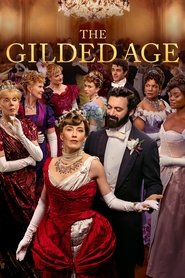A January 2022 New York Times article by Dave Itzkoff reports that Bertha Russell (played by Carrie Coon) is "an Alva Vanderbilt-like character." Alva Erskine Smith Vanderbilt Belmont was born in 1853 into a wealthy, slave-owning family from Mobile, Alabama. In her early 20s, she was married to William Kissam Vanderbilt, a grandson of Cornelius Vanderbilt (one of the original "robber barons," Cornelius Vanderbilt was a railroad and shipping magnate and the patriarch of the wealthy and influential Vanderbilt family). Alva felt snubbed by the doyennes of "old money" New York, especially by Caroline Schermerhorn Astor, so she threw balls so lavish that Mrs. Astor's set--including her own daughter, Carrie--could not resist attending. When Alva was rejected for membership in the Academy of Music (then the city's preeminent opera house, with the exclusive boxes only available to the "old money" families), Alva joined with other "new money" elites to found a new opera house--the Metropolitan Opera, which (unlike the Academy) is still open as of January 2022. Alva arranged a marriage between her first-born child--the teenaged Consuelo Vanderbilt--and Charles Spencer-Churchill, 9th Duke of Marlborough, a match that was considered paradigmatic of the "Dollar Princess" model of marriage whereby a wealthy but untitled American girl was matched with a cash-poor aristocratic British heir, thereby infusing his family with money and her family with status. Alva was in some ways an untraditional woman for her era and social class; she divorced W. K. Vanderbilt for his infidelity at a time when divorce was all-but-unheard-of in her circles; and after remarrying to another wealthy and socially prominent man, Oliver Hazard Perry Belmont, she became devoted to the the women's suffrage movement. In her book Gilded Suffragists: The New York Socialites Who Fought for Women's Right to Vote, historian Johanna Neumann recounts that Alva even courted controversy inside the already-controversial suffrage movement by being one of the very few white suffrage activists to try to reach out to and include Black women in the cause, though her efforts were highly unpopular among most white suffragists. The marriage between Consuelo and Charles was so unhappy that, a quarter-century after Alva's divorce from Consuelo's father, Consuelo was also able to obtain a divorce (an even more rare occurrence then in British aristocracy than in American high society); Alva testified on her daughter's behalf at the divorce proceedings, admitting that she had forced her daughter into the marriage.
Scritto da il
05-03-2025 alle ore 08:37
Immagini
Nessun dato in archivio
Consiglia
Voto
Nessun dato in archivio
Commenti
Nessun dato in archivio
SerieTv
Nessun dato in archivio
